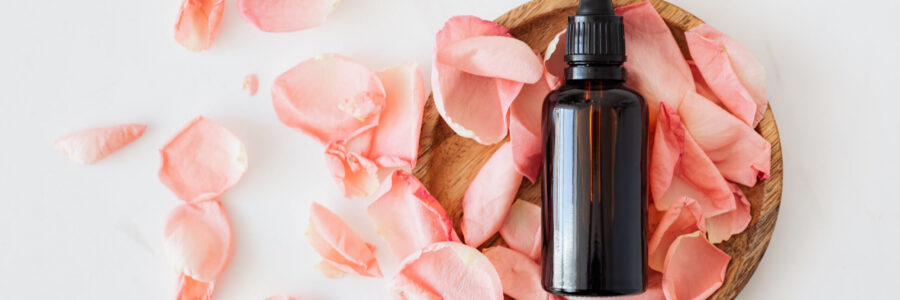Aromatic, potent, and often healing, essential oils are now a common ingredient in natural skin care products. They smell heavenly, are a great alternative to artificial fragrances, and deliver health benefits to boot. Pure oils can also be added to air diffusers to scent your home, or to your bath water, or to your laundry to release their scent and healing properties throughout your home.
Aromatherapy Oils
Essential oils are the foundation of a healing art called “aromatherapy.” With aromatherapy, you can choose certain scents to address stress and anxiety, to help you sleep, or to invigorate you on low energy days. The scents can send chemical signals to different parts of the brain to trigger neurotransmitters that have powerful mood-altering effects.
Aromatherapy 101
Looking for the right therapeutic essential oil to diffuse? Here are just a few you can keep on hand:
Relaxing, calming: Clary Sage, Rose
Sleep inducing: Lavender, Chamomile
Mood Lifting: Tangerine, Jasmine
Energizing, Invigorating: Grapefruit, Peppermint
Sensual, Aphrodisiac: Ylang Ylang, Neroli
Just a Drop or Two Will Do
Essential oils are pressed directly from plant sources and are extremely concentrated. That’s why in most applications, whether diffused into the air, or in your bath or lotion, you only need a few drops.
Most essential oils are too concentrated to use directly on your skin. That’s why even those with non-sensitive skin can find essential oils irritating if applied directly. Essential oils are normally diluted with a carrier oil or lotion for topical use. Just a few drops in a tubful of water, or an entire bottle of oil or lotion will release a powerful scent.
Skin Benefits
Certain oils have anti-biotic, anti-microbial properties, such as tea tree and lemongrass oils. In fact, tea tree oil is often used in cleansers and skin treatments for acne, since it has proven antiseptic, antibacterial, and anti-inflammatory properties. Other oils also offer anti-inflammatory benefits and may soothe red and itching skin, such as sandalwood, chamomile and lavender. Yet even when using them medicinally, be sure to dilute them and read up on the oil you choose or discuss contraindications with your health professional.
Essential Oil Safety
Look for good quality essential oils without any additional or artificial ingredients (a bit of vegetable oil listed as an ingredient is okay as it is sometimes necessary with highly concentrated oils.) Like any oil, essential oils can also spoil or go rancid over time. Store them in a cool place, and check to see if there is an expiration date before you purchase.
In fact, essential oils, like other botanical and herbal medicines, are so powerful, they can have a cumulative effect, and can also interfere with prescriptions you are taking – so be sure to discuss essential oil use with your healthcare provider. Some oils should even be avoided in pregnancy, by older people and for use with infants.
The Best Way to Introduce Essential Oils
Like all new cosmetic ingredients, if you have a chronic skin condition, it’s important to test and go slow with essential oils as they can cause allergic reactions or trigger a flare-up. Before diffusing it into the air or adding it freely to your bath or lotion, test a drop of an essential oil in a base of a neutral oil or cream that you know is tolerated well by your skin. Apply it to a small patch of skin on your arm. Watch carefully for a day or so to see if there is any reaction.
Some essential oils can damage your skin if used topically: stay away from cumin and citrus oils, and any known allergens. If you are allergic to the food or plant, you will most likely be allergic to its oil.
Also, never apply undiluted essential oil directly on damaged skin – including inflamed patches in cases of eczema, psoriasis or TSW, and keep essential oils away from your eyes, nose, mouth, and genitals. Essential oils should never be taken internally without the guidance of a health professional.
Fabulous, Fun and Fragrant!
With “going slow” as the key word, essential oils are a great way to turn your home and your self-care regime into a nurturing, sensory sanctuary. Find an oil you like at your local health food store and experiment!
Want to Learn More About Skin Health?
Click HERE to get the Amethyst Holistic Skin Solutions Newsletter. You’ll receive interesting information about skin health via articles, before/after pictures, case studies of Amethyst patients, videos, interviews and more. Feel free to share this article with someone who you think may benefit.
About the Author
Olivia Hsu Friedman, LAc, Dipl.OM, DACM, Cert. TCMDerm, is the owner of Amethyst Holistic Skin Solutions and treats Acne, Eczema, Psoriasis, and TSW. Olivia treats patients via video conferencing using only herbal medicine. Olivia is Chair of the Board of Directors of the American Society of Acupuncturists, serves on the Advisory Board of LearnSkin, and is a faculty member of the Chicago Integrative Eczema Group sponsored by the National Eczema Association.



